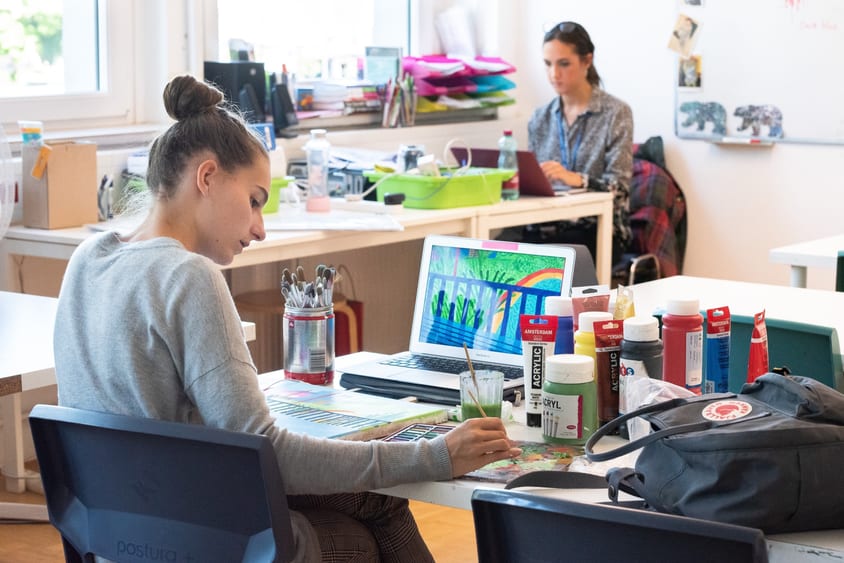At the British International School of Ljubljana, we take pride in theoutstanding academic outcomes of our students and theUniversity destinations that they are offered once they finish at our school. 100% of our students are offered university places after completing Year 13 at the end of their academic studies. All examinations (with the exception of French and German), are taken in English. At BISL, the comprehensiveEnglish provision and outstanding progress of students across the school with their literacy is well above UK and international standards. All individual successes are valued, and we hold in high regard our Secondary school examination provision that helps to support, encourage, and challenge our students to get the best exam results possible.
In the summer of 2020, the grades achieved by our students were the highest in the 12-year history of the school.
We would like to share with you our approach, beliefs, and strategies at school and how we have facilitated our learners to make outstanding progress each year.
What we believe…
- Driving high standards of academic excellence for our students.
- All students can dream big, aim high and attain the best grades.
- This is a team effort from Students, Parents and Teachers.
- Students need to be encouraged, supported, and challenged through inspirational teaching and high-quality feedback.
- Systems and ‘safety nets’ should be in place to ensure we work together and communicate early if expected progress is not met.
- We consider the evidenced-based research from the best institutes in the world along with what works best for our students in BISL.

At the British International School of Ljubljana, we believe that students should start their exam preparation early, focus on creating a good plan with all of the key resources needed and to learn over time with active revision strategies to embed knowledge, skills and understanding.”BISL Advice5 Key Areas to Support Exam Performance
1. Preparation
- Speak to your teachers, identify areas to revise from your mock or past exams or techniques to improve (time management, misreading questions, not showing calculations or not providing evidence etc).
- Check the most up-to-date syllabus for every subject from CAIEor the BISL curriculum plans page.
- Find out about the exam format (structure, command words, short tasks or essay-based, multiple choice etc).
2.Organisation
- Read the examiner's / teacher's report and check past papers.
- Ask your teachers questions or email them if you are unsure about a topic, question or an area of study.
- Ensure that you have an appropriate workspace in order to concentrate without distractions.
- Replicate an exam environment whilst studying to boost confidence and increase memory retrieval.
- Make sure you have all the correct resources, textbooks, workbooks etc.
3.Create a Plan
- Create a revision timetable.
- Include time for breaks, for exercise and to keep healthy.
- Try different versions (Getrevising, Goconqr, Google Calendar etc.).
- Take a look at the Cambridge Final Exam Timetable June 2021 Administrative zone 3.
4.Start Early
- Use spaced practice and retain new information over a long period of time.
- Understand how we remember knowledge and how to retain information (Forgetting Curve and increasing memory strength).
- To reduce stress, identify weaker subjects, improving grades etc. start early and benefit from positive effects.
5.Practice
- Active retrieval is far more effective than re-reading or repeating information. Testing yourself is key.
- To boost your memory skills during revision season, try some of these tips from the British Council.
- Exposing yourself to 'test conditions' forces your brain to cope with time management and therefore perform better under pressure.

The best way to increase confidence and reduce anxiety is to be well prepared, so start your revision in good time. Many tutors in Oxford will build it into your course but you will need to make your own plans as well to make sure you have covered all the topics you think you need to know.”University of OxfordUsing your phone, listening to music and other electronic devices...
At the British International School of Ljubljana, we believe that you should use revision time to focus on your exams, replicating when possible exam conditions, turning off electronic devices and using the active revision techniques.
Listening to music does not increase your ability to learn with the often misquoted ‘Mozart Effect’ used , other meta studies have shown no increase in IQ or reasoning ability in general. We often say that listening to music helps, but in fact this is something that makes people feel good and does not have a direct correlation on helping students revise. With exam revision and retaining knowledge (for exams and exam conditions), no music is preferred, however there is some research about listening to music for creativity but this is inconclusive. The same could be said about eating ice cream, tasty food/drinks or other activities that students enjoy but these again do not impact upon increasing IQ or information retention.
There are, however, somefoods that do positively affect brain function and memory in order to support the acquisition of new knowledge. The use of mobile phones can reduce cognitive capacity when students are revising.
“If you and your friends send each other messages every five minutes, you will find it very difficult to concentrate on what you are learning. So,switch off your phone and your favourite social network sites while you are studying! You can send messages to your friends during your breaks.”
https://learnenglishteens.britishcouncil.org/exams/exam-study-tips/phones-and-other-distractions
"We found that listening to liked or disliked music was exactly the same, and both were worse than the quiet control condition," he says. "Both impaired performance on serial-recall tasks."
https://www.edutopia.org/blog/dont-listen-music-while-studying-david-cutler
“Well, for a start, don’t listen to music! The research on cognition and memory suggests that certain types of music may be helpful, however, when it comes to examination conditions in which pupils are required to recall and retrieval information (both required for examination purpose) from their long term memory, if pupils learn in one way and are tested in another, performance will be limited.”
https://www.teachertoolkit.co.uk/2019/05/19/music-and-revising/

Research-based methods
Active Revision requires you to get involved, to participate and use / organise material.
Try and use paper-based or electronic active learning to support your revision. Keep rote learning to a minimum – just the formulae which are required. Revise for understanding, not just memorising. Here are various methods of Active Revision:
- Active Learning.
- Cone of Learning (Edgar Dale 1967).
- Testing yourself with questions + Researching over time from 1000 scientific studies (Prof Dunlovsky 2013).
- Mindset and Praise for Effort (Mueller and Dweck 2002).
- Lack of Sleep impairs reasoning and memory (Pamela Thacher 2003).
- Reducing novelty and stress of the exam day (Sian Beilock 2009).
- Using Flashcards and memory (Hermann Ebbinghaus 1970)
- Keywords and intervals (Bahrick, H. P. et al. 1993)
- Foods to boost brain power (Jo Lewin)
- The influence of Exercise on cognitive abilities (Fernando Gomez- Pinilla, Charles Hillman 2013)
- Information viewed amid distractions (Nicole Dudukovic)
- The Protégé Effect + Betty's Brain @ Stanford Uni (While we teach, we learn 2007)
Revising actively implies making a real effort to understand what you are learning, rather than simply memorising by rote. Even if your exams require you to remember a lot of facts, you are much more likely to retain detailed information if it is related to an underlying understanding.”The University of Edinburgh
Active revision examples
- Diagrams/Mind maps. (https://padlet.com/, https://www.popplet.com/, https://www.mindmeister.com/)
- Flash cards then discussing topics with a friend. (https://quizlet.com/en-gb, https://www.memrise.com/, )
- Questions. (https://kahoot.it/, https://www.quiz-maker.com/, https://www.onlinequizcreator.com/)
- Linking problems. (https://sketchboard.io/, https://app.diagrams.net/, https://drawisland.com/)
- Similarities/differences/advantages+disadvantages. (https://creately.com/lp/venn-diagram-maker/, https://www.gliffy.com/)
- Post-it notes (https://www.post-it.com/3M/en_US/post-it/ideas/app/ )
- Looking for points for and against an argument. http://listmoz.com/#DpqTz0BTrqP9LKYZ7w
- Identifying themes or principles. http://justnotepad.com/
- Creating questions and answers/true and false. https://quizterra.com/en/blog/how-to-create-true-false-quiz
- Rhythm, speech etc. https://www.mnemonicgenerator.com/
- Pictures, drawings, colour code work.
Ideas for active revision
- Online Polls - https://www.polleverywhere.com
- Create and Share lessons - http://www.showme.com
- Timelines - http://timeglider.com
- Brainstorming - https://bubbl.us
- Mind map - https://www.mindmup.com/
- Mnemonic generator - http://www.mnemonicgenerator.com
- Annotate work - https://www.annotate.co/
- Collaborative Moodboards - https://niice.co
- Infographics - https://infogr.am ;https://piktochart.com
- Organisation - https://www.wunderlist.com
- Online Sticky Notes - http://note.ly

Exam revision tips
- Reward yourself by setting and reaching your study goals.
- Plan your weeks and months carefully, so that you have a daily schedule that you can follow, ensuring that your study times are factored into it. Take careful note of the lead-up to assessments, spacing out your study sessions deliberately.
- Tips on preparing for exams from the NHS (National Health Service in the UK): being well prepared for your exams is the best way to overcome stress and anxiety, and gives you the best chance of getting good grades.
- Get enough sleep and keep to a regular bedtime to ensure that you are well rested and prepared for the next day of learning.
- Here are some tips to help with exam stress and to promote your wellbeing when preparing for and writing an exam.
- Developed by students for students, an ‘Exam success guide’ from UCL (University College London).
- Exercising for exam success at the University of Surrey.
- What to eat? Can food improve your exam performance? - BBC (British Broadcasting Corporation).
Additional links to Universities and guidance from around the world
University of Oxford Exam Wellbeing
Cambridge Assessment International Exams - study resources
Durham University - Revision and Exams
Kings College London - Top Study and Exam Tips
The University of Edinburgh - Effective Studying
Harvard - Science-backed ways toward better learning
Princeton University - 10 ways to study
With a track record for excellence in academic outcomes, the British International School of Ljubljana will be with you every step of the way. We will support, encourage and challenge you through your exam revision to make sure that you have the best possible chance of attaining the grades that you deserve.

At the British International School of Ljubljana, we believe that students should start their exam preparation early, focus on creating a good plan with all of the key resources needed and to learn over time with active revision strategies to embed knowledge, skills and understanding.”Start your preparation early, have a good plan and try to learn over time.
We look forward to facing this shared challenge ahead together, and are all excited about what you can achieve.
British International School of Ljubljana




